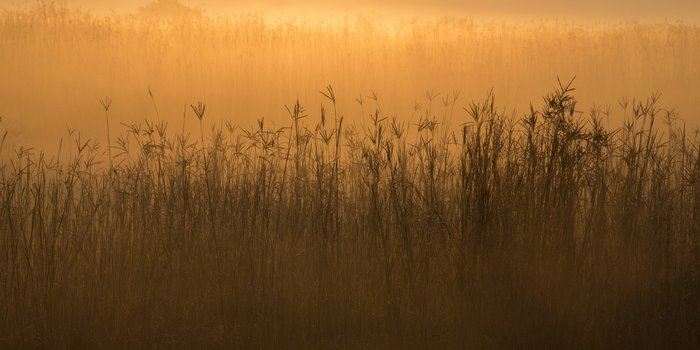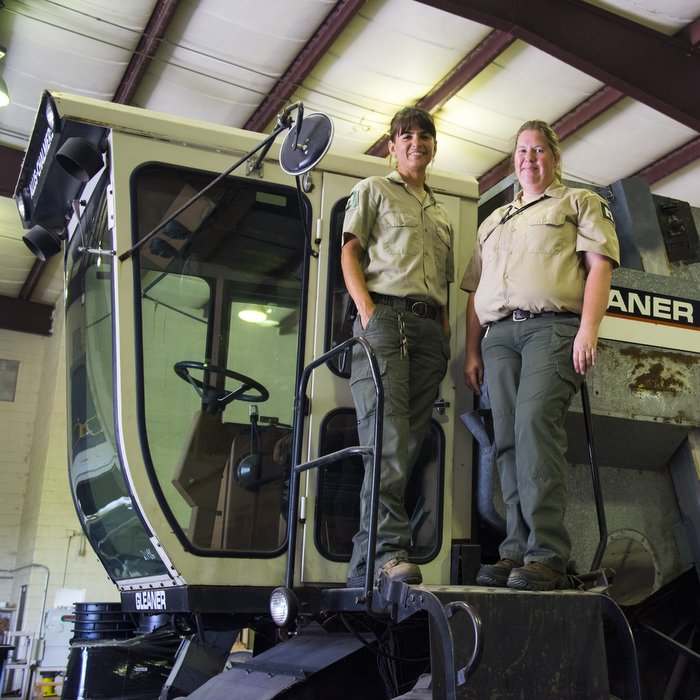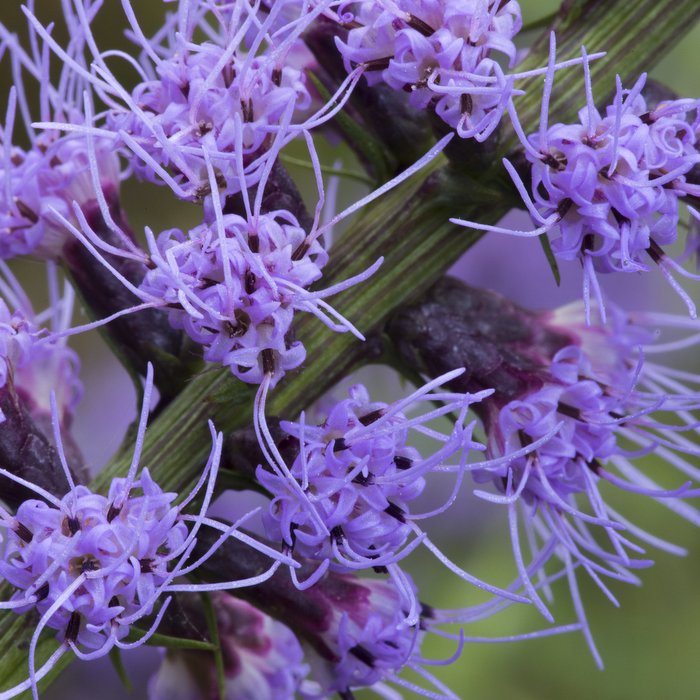Former Prison Farm Now Harvests Native Seed

A farm where prisoners once served time now produces more than a half-ton of native plant seeds a year to restore natural areas for Metroparks.
In Fall, you will find “Allis,” an adapted 1984 Allis-Chalmers F3 Gleaner harvester, collecting seed from plants in the 17-acre propagation field at Blue Creek Metropark. The Native Seed Nursery there grows 66 species of plants to supply seed for restoration projects across Lucas County.
From now until Fall, you will find the two year-round and four seasonal staff – along with volunteers ranging in age from teens to 92 – tending plants in two greenhouses, driving a tractor with a seed drill or collecting seed in the wild. The team produces or collects seeds from more than 280 species.

Photo: Jenella Hodel and Penny Niday
“We are continually adding new species,” said Penny Niday, seed nursery coordinator. She said the nursery has seeds from more than 400 species cached for future use.
“It’s invaluable, the stock that we have, because you can’t purchase Oak Openings species anywhere,” said Jenella Hodel, seed nursery crew leader, referring to the eco-region west of Toledo that is home to more than 1,200 plants, from prairie to wetland species.
Since the seed nursery started in 2004, seeds and plants from the operation have restored over 400 acres of natural area, mostly in the Oak Openings. In addition to meeting the park district’s needs, the nursery supplies seed to other organizations as part of the Green Ribbon Initiative, a consortium of non-profit and government agencies involved in preserving and restoring the globally distinct ecosystem
“The nursery is absolutely essential to the success of Metroparks’ mission to protect our region’s natural resources,” said Tim Schetter, Ph.D., director of natural resources for the park district. “Locally grown plant material is critical for restoring wildlife habitat, supporting local pollinator populations and enhancing the species richness of our region’s parks and preserves.”
The seed nursery is part of a sprawling 676-acre property that Metroparks acquired in 2000. It is also home to two quarries used for boating and fishing, athletic fields, a wildlife rehabilitation center and demonstration farm fields maintained by the county soil and water conservation district.
Locals know the property as “the workhouse” because for 70 years it was the Toledo House of Corrections, or the “welfare farm.” In the 1920s, those sentenced to serve up to a year in jail would care for livestock and crops, or work in the onsite cannery or stone quarries.
The 1918 jail building was razed, but a newer building that housed a gymnasium and women’s dormitory is now home to the nursery operation, where seeds dry in paper bags hung from a clothesline or spread out on drying racks.
Niday, who has worked at the nursery since its inception, said the first year the operation raised 25 species with the help of volunteers and local high schools, which grow the plants in their greenhouses. Then, seed was collected by hand. Now, the combine and a custom-made sweep harvester built by Metroparks construction crew do the work.
Hodel said a tree and shrub nursery is the newest addition to the operation. It provides stock for restoring native understory habitat where invasive species have been removed.

Photo: Blazing star
What’s Growing at Blue Creek
Colic-root
Big bluestem
Prairie thimbleweed
Woodland thimbleweed
Wild columbine
Swamp milkweed
Butterfly-weed
Yellow false indigo
Buxbaum's sedge
Crested sedge
Graceful sedge
Wire-grass
Muhlenberg's sedge
New Jersey tea
Buttonbush
Partridge pea
Tall coreopsis
Showy tick-trefoil
Sessile-leaved tick-trefoil
Flat-topped aster
Hollow Joe-Pye weed
Boneset
Great lakes goldenrod
Woodland sunflower
Tall sunflower
Western sunflower
Halberd-leaved rose mallow
Shrubby St. John's-wort
June grass
Roundhead bushclover
Rough blazing-star
Scaly blazing-star
Cardinal-flower
Great blue lobelia
Wild lupine
Blue monkey-flower
Wild bergamot
Glade mallow
Foxglove beard-tongue
Obedient plant
Tall cinquefoil
Hairy mountain mint
Narrow-leaved mountain mint
Common mountain mint
Gray-headed coneflower
Black-eyed Susan
Three-lobed coneflower
Little bluestem
Northern wild senna
Compass plant
Cup-plant
Prairie-dock
Early goldenrod
Gray goldenrod
Riddell’s goldenrod
Stiff goldenrod
Showy goldenrod
Indiangrass
Prairie cord grass
Sand dropseed
New England aster
Veiny lined aster
Fen aster
Blue vervain
Tall ironweed
Culver’s-root